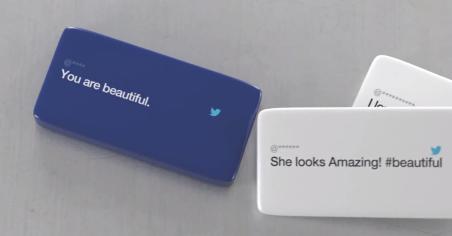 I’ve been online long enough to see a lot of negativity. I wear a bracelet that reads “Don’t. Read. The. Comments.” (a gift from Molly Steenson) to remind myself that going down the path of negativity is not helpful to my soul or sanity. I grew up in a geeky environment, determined to prove that I could handle anything, to stomach the notion that “if you can’t stand the heat, get out of the kitchen.” My battle scars are part of who I am. But why does it have to be this way?
I’ve been online long enough to see a lot of negativity. I wear a bracelet that reads “Don’t. Read. The. Comments.” (a gift from Molly Steenson) to remind myself that going down the path of negativity is not helpful to my soul or sanity. I grew up in a geeky environment, determined to prove that I could handle anything, to stomach the notion that “if you can’t stand the heat, get out of the kitchen.” My battle scars are part of who I am. But why does it have to be this way?
Over the last few years, as the internet went from being a geeky subculture to something that is truly mainstream, I started watching as young women used technology to demean themselves and each other. It has broken my heart over and over again. Women are hurting themselves in the process of hurting each other with their words. The answer isn’t to just ask everyone out there to develop a thick skin. A world of meanness and cruelty is destructive to all involved and we all need to push back at it, especially those of us who have the strength to stomach the heat.
I’m delighted and honored to partner with Dove and Twitter to change the conversation. In an effort to better understand what’s happening, Dove surveyed women and Twitter analyzed tweets. Even though only 9% of women surveyed admit to posting negative comments on social media, over 5 million negative tweets about beauty and body image were posted in 2014 alone and 4 out of 5 of those tweets appeared to come from women. Women know that negative comments are destructive to their self-esteem and to those around them and, yet, the women surveyed reported they are 50% more likely to say something negative than positive. What is happening here?
This weekend, we will watch celebrities parade down the red carpet wearing gorgeous gowns as they enter a theater to celebrate the pinnacle of film accomplishments. Yet, if history serves, the social media conversation around the Oscar’s will be filled with harsh commentary regarding celebrities’ beauty and self-loathing.
We live in a world in which self-critique and ugliness is not only accepted, but the norm. Especially for women. Yet, so many women are unable to see how what they say not only erodes their own self-worth, but harms others. Every time we tear someone down for what they’re wearing or how they’re acting – and every time that we talk badly about ourselves – we contribute to a culture of cruelty in which women are systemically disempowered. This has to change.
It’s high time that we all stop and reflect on what we’re saying and posting when we use our fingers to talk in public. It’s time to #Speak Beautiful. Negative commentary has a domino effect. But so does positive commentary.
In an effort to change the norm, Dove and Twitter have come together to try to combat negativity with positive thoughts. Beyond this video, they are working together to identify negative tweets and reach out to women who might not realize the ramifications of what they say. Social media and self-esteem experts will offer advice in an effort to empower women to speak with more confidence, optimism, and kindness.
Will this solve the problem? No. But the modest goal of this campaign is to get more women to step back and reflect about what they’re saying. At the end of the day, it’s us who need to solve the problem. We need to all collectively make a conscious decision to stop the ugliness. We need to #SpeakBeautiful.
I am honored to be able to contribute to this effort and I invite you to do the same. Spend some time today and over the weekend thinking about the negativity you see around you on social media and push back against it. If your instinct is to critique, take a moment to say something positive. An effort to #SpeakBeautiful is both selfish and altruistic. You help others while helping yourself.
I know that I will spend the weekend thinking about my grandmother, a beautiful woman in her 90s who grew up being told that negative thoughts were thoughts against God. As a teenager, I couldn’t understand how she could stay positive no matter what happened around her but as I grow older, I’m in awe of her ability to find the beauty in everything. I’ve watched this sustain her into her old age. I only wish more people could find the nourishment of such positivity. So let’s all take a moment to #SpeakBeautiful, for ourselves and for those around us.


This bundles up the idea that women must be beautiful. Truth is some are, some aren’t. It’s okay to not be. It’s okay to not prioritise your appearance. It’s okay to not perform for others. It is not important to always perform in the narrow and changing criteria that society currently defines as beautiful.
When I leave the house today, being beautiful is not on my check list. Wearing something comfortable enough to climb a tree in short notice is.
Okay, this will be a fun way to enjoy the red carpet and not be a couch potato. I may not be able to avoid the phrase ‘unfortunate choice’ but I’ll praise the good choices out loud for a change.
Bullying is the easy way out for those that can’t feel good any other way without putting others down. I hope this all leads to a long overdue focus on the improvement of mental health services in this country!
Hi Danah, I love this. So glad to read about this and to hear you’re doing this too. These new conversations are so needed!
I hope this doesn’t fall into the “don’t read the comments” category, but since you are explaining your motivation in partnering with Dove and Twitter, would you be willing to comment on whether this is a partnership that you get paid for or compensated for in any way? I understand you occupy a hybrid professional world, but my sense is that in an academic context, it would be customary to be transparent about the nature of your relationship to this campaign (initiated by two for-profit entities). This information might also shed more light on your description of participation in this initiative as “both selfish and altruistic.” It would also shed some light on the invitation to others to participate: are you asking them to participate on the same terms as you are (that is, you are volunteering and you would like them to volunteer their time as well), or on different terms (you are getting compensated and are asking others to volunteer). Thanks for your time!
Hi dana,
I am a huge fan and reader of your work. I’ve been immensely influenced by your book and research, and have recommended them to so many people in my network of educators and friends. I think you have done so much to bring nuance and complexity to our understanding of adolescents and social media.
I wanted to let you know that I’m a little puzzled by your endorsement of Dove’s campaign as I find it difficult to reconcile how their parent company, Unilever, on one hand, has a campaign to bring down misogynist attitudes with Dove, while, on the other, tacitly and explicitly supporting these same structures in their other brands such as Axe/Lynx and Tresemme. I am trying my best not to be cynical about Dove’s intentions, but I can’t help see the hypocrisy in their marketing. Would love to see/hear your thoughts on this.
This is such a great campaign effort and I am so glad I read it today. I am teaching my intro to anthro students to code twerking videos of girls 13-17 and younger who twerk on YouTube. it’s really a project about how girls see themselves and how others respond to their images online.
Most of the comments under these videos are like grooming girls for sexual objectification if not a form of digital sex trafficking. Whenever I tell anyone this is the work I do to study the intersection of race and gender in social media and digital video, their response 90% of the time is disgust or upset not curiousity and openness.
One Chinese woman in my digital ethnography class that also studied twerking videos of black girls last semester said she noticed in the comments that no one talks about black girls as beautiful, no matter what they look like, no matter who well they dance. It’s usually more like this comment about an 8 year old twerking while her younger brother records their bedroom play:
“Wow! She’s good! She cute, thick and she wasn’t scared to show her skills. She just had on to many clothes. Let her twerk in her panties so she can really show off! If u have kik kik me at ch1costick so we can talk”
There is no beauty in these interactions. No respect for girls or for minors. So I love the #SpeakBeautiful campaign. Thanks to Dove and Twitter for doing this! Would love to know more about who thought of this campaign and what events prompted it.
Best,
Kyra
JF: In return for work that I did on the research product and my contribution to communicating the research, I am receiving an unrestricted gift that will allow me to do other research. So while I’m not being personally compensated, research collaborations like this do provide resources to fund other research efforts of mine. I have long done consulting work to fund my research efforts. That said, I have historically posted about other Dove Real Beauty campaigns without receiving compensation. What’s different this time was that I was involved in the research itself in an effort to understand what was at stake. And I’m glad that I was because I learned a lot in the process and I genuinely believe in the goal.
My ask of others is to be thoughtful about what they post. This stems from the findings that come from the research. I don’t think that people need to add or spread #SpeakBeautiful to do so. As with all campaigns that involve a company, people have the right to be doubtful of the intentions of that company. But this is a message that needs to be heard and I’m very grateful to Dove and Twitter for spending the time and resources to do research to uncover what’s happening. And so my hope is that people will embrace and spread the message, even if they do so removed from the campaign itself.
I’ve spent the better part of my adult life working on issues related to violence against women and girls and meanness and cruelty. It’s been depressing how little data there is on so many of these issues and so the opportunity to contribute to their research efforts was very synergistic. And I’m also very grateful that doing so allows me to continue doing other research. But I will respect that some people don’t feel as though this is an acceptable trade-off. This has been a challenge for my entire research career because my consulting and corporate work has always funded my research and I wouldn’t have been able to do what I’ve done without the support of companies.